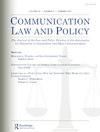Expanding Media Law and Policy Education: Confronting Power, Defining Freedom, Awakening Participation
IF 0.2
Q4 LAW
引用次数: 2
Abstract
The changes brought about by the Digital Age have not triggered significant increases in political participation or meaningful reductions in longstanding social power asymmetries, which are now increasingly negotiated in policy contexts that involve mass media (surveillance, big data, net neutrality). At the same time, new technology and communication patterns have opened fissures in public opinion about the limits of free expression while also creating new legal risks for citizen-communicators. This article suggests that universities need to recalibrate their curricula to meet the exigencies of this moment, which should include an increased emphasis on media law and policy courses and initiatives. The article outlines a rationale for action, and some strategies, based on the need to: (1) expand citizens’ expressive agency by equipping them with the knowledge to shield themselves from overt restraints and subtle forms of coercion; (2) deepen citizens’ civics knowledge, enhance their political efficacy and enable their political participation; (3) facilitate citizens’ engagement in reemerging debates about the meaning and scope of the First Amendment; and (4) spur citizen involvement in confronting pressing constitutional and media policy issues whose resolution will ultimately shape the broader balance of social power.拓展传媒法律与政策教育:直面权力、定义自由、唤醒参与
数字时代带来的变化并没有引发政治参与的显著增加,也没有引发长期存在的社会权力不对称的有意义的减少,这些不对称现在越来越多地在涉及大众媒体(监控、大数据、网络中立)的政策背景下进行谈判。与此同时,新技术和传播模式在公众舆论中对言论自由的局限性产生了分歧,同时也给公民传播者带来了新的法律风险。这篇文章建议,大学需要重新调整课程以满足这一时刻的迫切需要,其中应该包括更加重视媒体法律和政策课程和举措。这篇文章概述了行动的理由和一些策略,基于以下需要:(1)通过使公民具备保护自己免受公开约束和微妙形式胁迫的知识来扩大公民的表达能力;(2) 深化公民的公民知识,提高公民的政治效能,促进公民的政治参与;(3) 促进公民参与关于《第一修正案》含义和范围的重新辩论;以及(4)促使公民参与应对紧迫的宪法和媒体政策问题,这些问题的解决将最终形成更广泛的社会权力平衡。
本文章由计算机程序翻译,如有差异,请以英文原文为准。
求助全文
约1分钟内获得全文
求助全文
来源期刊
CiteScore
0.60
自引率
33.30%
发文量
7
期刊介绍:
The societal, cultural, economic and political dimensions of communication, including the freedoms of speech and press, are undergoing dramatic global changes. The convergence of the mass media, telecommunications, and computers has raised important questions reflected in analyses of modern communication law, policy, and regulation. Serving as a forum for discussions of these continuing and emerging questions, Communication Law and Policy considers traditional and contemporary problems of freedom of expression and dissemination, including theoretical, conceptual and methodological issues inherent in the special conditions presented by new media and information technologies.

 求助内容:
求助内容: 应助结果提醒方式:
应助结果提醒方式:


